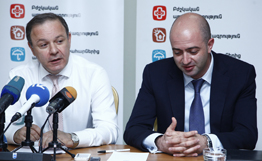YEREVAN, July 4. /ARKA/. The World Bank’s Board of Executive Directors approved July 3 a US$12 million credit for the Tax Administration Modernization Project (TAMP) for Armenia, World Bank Yerevan Office told ARKA.
It said the Project will support the State Revenue Committee (SRC) to modernize its business processes, expand the use of e-governance including electronic filing of tax returns, and introduce a more targeted, risk-based compliance strategy, based on voluntary compliance.
The Government of Armenia recognizes that both tax administration and tax policy improvements are needed to enhance revenue performance, and is committed to implement comprehensive tax administration reforms. To guide tax policy reforms, the Government has issued a strategy paper outlining planned tax policy measures over the medium-term 2012-14.
“The Government – with the support of development partners, notably the IMF, IFC, USAID and the World Bank – has already taken steps to improve its revenue administration,” said Jean-Michel Happi, World Bank Country Manager for Armenia. “Building on these efforts, this Project provides the framework and financing to support a comprehensive modernization of Armenia’s revenue administration. This operation is central to the Bank’s on-going Country Partnership Strategy for Armenia as it’s focused on enhancing the competitiveness of domestic economy.”
The SRC has maintained the level of revenue collection through the recent economic downturn. However, Armenia’s tax (excluding social security contributions) to GDP ratio at about 16.3 percent remains low for its level of income. Further gains in revenue collection are required to create fiscal space for investments in key public services and infrastructure, to deliver on the Government’s poverty reduction and economic growth objectives. At the same time, the tax administration needs to be modernized to improve the business climate and to enhance private sector development and growth.
The proposed project will increase voluntary tax compliance of tax payers, reduce tax evasion and compliance costs, as well as increase SRC’s administrative efficiency. These objectives will be achieved by i) introducing modern, integrated information technology to support SRC operations; ii) improving data exchange between the SRC and other agencies to enhance risk management and targeting of compliance activities; iii) reengineering and automation of business processes to improve efficiency and effectiveness; and iv) expanding e-Government, including e-filing and e-payments to lower the compliance burden for the private sector.
“This operation will make critical investments in the SRC’s basic Information and Communications Technology infrastructure,” said Sebastian Eckardt, World Bank economist and the leader of the Project. “Improved information technology support is an important enabler for the implementation of the next round of tax administration reforms and for the enhanced performance of the SRC.”
To ensure sound implementation, the Project will be overseen by a Steering Committee composed of high level representatives of the Presidential Administration, Prime Minister’s Office, the Minister of Finance and the Chairman of the SRC to make key strategic decisions and monitor overall project implementation progress.
The Project will be implemented in a strategic partnership between the SRC, World Bank, USAID, and other development partners. Extensive, complementary technical assistance will be financed under the USAID Tax Reform Project. World Bank and USAID projects will work in close collaboration.
The total amount of the project is US$15.1 million, of which the Government of Armenia will finance US$3.1 million. The IDA credit in the amount of US$12 million carries a maturity of 25 years including a grace period of 5 years.
Since joining the World Bank in 1992 and IDA in 1993, the total IDA and IBRD commitments to Armenia amount to US$1, 624 million. -0-






